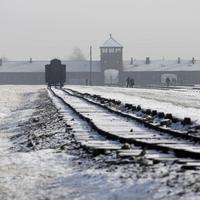Minoritatea romilor din Moldova: de la Holocaust la singurătatea amintirilor
În Republica Moldova se vorbește cu jumătate de gură despre genocidul suportat de romi (Ion Duminică). În 1942, în timpul celui de-al Doilea Război Mondial, au fost deportaţi în stepele Bugului peste 25 de mii de romi de pe întreg teritoriul României, inclusiv din ceea ce se numea pe atunci Basarabia. Tragedia lor a fost trecută multă vreme sub tăcere, pe ambele maluri ale Prutului. La o rară dezbatere organizată pe acest subiect la Chișinău a participat astăzi corespondenta noastră. Octogenarul Alexandru Răducanu era de-o șchioapă când a fost forţat, alături de părinţi şi cei şapte fraţi ai săi, să lase casă, masă şi să plece undeva spre Bug. Nu prea înţelegeau ce li se întâmplă pentru că nu ştiau carte, deci nu citeau ziarele timpului. Abia când s-au pomenit într-un lagăr de concentrare din Transnistria, creat pe ruinele unei crescătorii de porci, au înţeles că viaţa le este în pericol. Nu uită nicio zi calvarul prin care a trecut, explică bătrânul, ducând degetul arătător la creştet: „Totul e întipărit aici. Cineva a citit despre Holocaust, alţii au auzit de acest fenomen, iar eu l-am trăit pe propria piele. Aveam 11 ani, nici nu înţelegeam ce înseamnă război. După ce au început să ne bombardeze mi-am dat seama cât e de gravă situaţia şi că ceva nu e în regulă. În familie eram opt copii. În lagăr ne-au pus să construim drumuri, munceam în cariere de piatră. Cine nu se conforma, acolo rămânea. În lagărul nostru erau peste 3 mii de romi, au rămas în viaţa câteva sute. Mureau de frig şi foame. Mâncam ce ne aruncau, varză, cartofi, pâine mucegăită.” În Republica Moldova nu se ştie cu certitudine câţi romi au supravieţuit Holocaustul şi câţi mai sunt astăzi în viaţă. Directorul executiv al Centrului Național al Romilor, Nicolae Rădiţă, spune că în urmă cu câţiva ani se vorbea despre câteva mii de bătrâni. La centrul pe care îl administrează sunt înregistraţi peste trei sute. Un lucru e cert, continuă Nicolae Rădiţă, majoritatea trăiesc sub pragul sărăciei şi cu mai puţin de zece dolari pe lună: „Pensia socială, pentru că ei nu beneficiază de pensie de vechime în muncă pentru că nu au acumulat staj de muncă, dar beneficiază de pensie socială, care este de 120 de lei, potrivit legii. Vă daţi seama că este imposibil de supraviețuit cu aceşti bani, mai ales că e vorba de bătrâni care au probleme de sănătate. Practic, ei au stat toată viaţa lor cu frica în sân, şi-au pierdut rudele, părinţii, soţii, copii şi continuă să trăiască şi astăzi în aceeaşi frică, pentru că ei nu sunt vizitaţi, trăiesc cu o pensie mizeră, aş spune chiar că trăiesc un Holocaust al prezentului, drama vieţii lor care continuă şi astăzi.” Un proaspăt sondaj realizat de Centrul Naţional al Romilor arată că pe lângă lipsa de bani, bătrânii, supravieţuitori ai Holocaustului, suferă de singurătate. Experta pe politici sociale din cadrul Centrului, Diana Leahu, a stat de vorbă cu peste 50 de pensionari romi. În ultimul an doar trei dintre ei au fost vizitaţi de un medic la domiciliu, spune experta: „În primul rând, sunt foarte singuri şi, pe lângă rude care îi lasă singuri, şi autorităţile îi lasă în voia sorţii. Vârstnicii în general sunt vulnerabili, însă cei romi în special. Populaţia romă într-adevăr este discriminată şi atunci când este vorba de romi, autorităţile pun toate responsabilităţile pe romi ca liderii romi, sau organizaţiile pentru romi cumva se eschivează de la responsabilităţile pe care le au pentru întreaga societate, nefăcând diferenţa dintre romi, neromi sau alte naţionalităţi.” În Republica Moldova se vorbește cu jumătate de gură despre genocidul suportat de romi, afirmă cercetătorul științific Ion Duminică, șeful secției „Minorități etnice”, de la Institutul Patrimoniului Cultural al Academiei de Științe a Moldovei. De curând autorităţile au arătat o deschidere pentru acest subiect sensibil, mai exact în vara acestui an, când Parlamentul a adoptat o declaraţie politică prin care a acceptat Raportul Comisiei Internaţionale pentru studierea Holocaustului în România, atestat cu denumirea Raportul Wiesel, după numele scriitorului de origine română şi laureatului premiului Nobel pentru Pace, Elie Wiesel. Documentul aminteşte, între altele, că în Transnistria au fost trimişi circa 25 mii de romi, iar 11 mii au murit. Holocaustul nu eşte uitat, insistă Ion Duminică, fenomenul este neglijat: „Însuşi romii din start l-au neglijat ca să nu aibă aceste memorii tragice. În al doilea rând, nici în perioada sovietică, nici în anii '90, nici acum manualele şcolare nu abordează acest fenomen. În general, fenomenul Holocaustului a fost abia cinci-zece ani în urmă introdus în manualele şcolare ca temă separată, iar asta spune multe. Practic, cetăţenii noştri când aud cuvântul Holocaust îl asociază mai mult cu evreii, dar, de fapt, victime ale acestui fenomen au fost şi evreii, şi romii.” Cum poate fi recuperată starea de lucruri? Un posibil răspuns îl oferă experienţele statelor vecine, spun experţii. În Ungaria, de exemplu, tinerii sunt încurajaţi să participe voluntar la restabilirea cimitirelor evreiești, iar în România dascălii au fost instruiți cum să le povestească, convingător, elevilor despre Holocaust. Astfel încât din fragedă copilărie ei să facă ordine în ierarhia valorilor, oricât de patetic ar suna acest deziderat.

